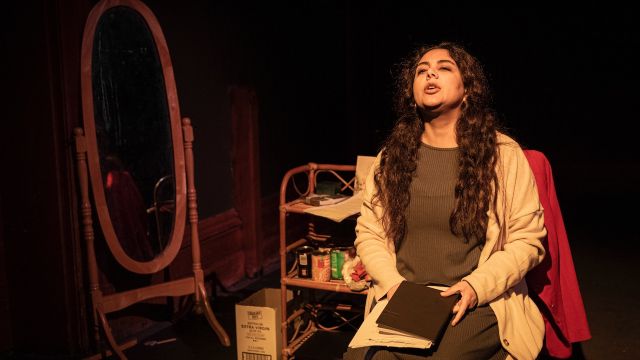In the Mirror
Two desperate people – unknown to each other - look into their mirrors. What do they see? Not themselves, but a version of themselves that might – just might – get them a job. Any job. Both are preparing for an interview. Both are rehearsing an acceptable persona. Each feels their real identity is disappearing.
Shaun (Scott Welsh), an older man, is long-term unemployed. He’s done very well on those two-day courses, on Work for the Dole schemes and he’s read all kinds of self-improvement books. None of that seems to help and Shaun is not sanguine about his chances; it’s all gone on too long. Virginia (Sahra Davoudi) an accountant, is an immigrant; she worries about her accent, about what to wear and stifles anger that her history is not acknowledged: she came to Australia to escape death and torture and now she’s ‘safe’ – but all she wants is a job. She, like Shaun, is in a kind of limbo.
Meanwhile, two high-powered and cynical recruiters (or HR people), well-dressed Paula (Helen Doig) and shark-in-a-suit Paul (Mark Tregonning) prepare for another round of interviews, revelling in their power to accept or more likely reject the hapless applicants that come before them. They have a junior, or trainee, eager-to-please but crippled with nervousness, Hendro (Zachary Kazepis), whom Paula and Paul regard as useless, a joke, but, after all, they didn’t interview him.

The particular business for which Paula and Paul work is never stated, nor are the jobs for which Shaun and Virginia prepare. Here, Mr Aidani sacrifices the power of the specific for the sake of a general point. (C.f., say, Glengarry Glen Ross.) We are prevented from making an inference for ourselves.
What Mr Aidani seeks to do is take us inside the helplessness and hopelessness of the long-term unemployed – the too old, the unqualified, the over-qualified, the simply unlikeable or unacceptable – and their antagonists, the agents of the employers. Unfortunately, these intentions are undermined by certain decisions that work against their realisation and their power. To my mind, Mr Aidani has allowed his perfectly understandable moral rage to overwhelm what he seeks to do as a dramatist. There are several consequences.

Firstly, he has a point to make, an argument to mount, but he does that with such over-emphasis and repetition that we can hear the wheels spinning: the play is perhaps, at 90 minutes, about 30 minutes too long. Shaun says all he has to say at least three times – and sadly we withdraw sympathy from his sad sack persona. (Leaving aside simple kindness, were I a businessperson, I wouldn’t hire Shaun.) Virginia fares better, despite some repetition, first because her predicament and backstory do evoke sympathy, and second because Sahra Davoudi is such a superb actor that she brings reality to every moment. (I would hire her, but I’m not Paula and Paul.) Paula and Paul are similarly repetitious and verge too quickly into caricature – cynical, insincere but constantly flattering each other, flirting, nasty and heartless. Helen Doig gets away with it by underplaying the cliché, just this side of arch. Zachary Kazepis’ Hendro seems only to be in the play to illustrate the power balance and that Paula and Paul can’t help themselves: they’ll get off on being shits to anybody they can. As for Mark Tregonning, I can only think that he – an actor of considerable experience – has been directed – by the playwright – to be consistently too loud and over the top in general. I could hear the restricted (by COVID) audience wince several times.
Mysteriously (spoiler alert), the play builds toward – or creates the unmistakeable expectation of – Shaun and Virginia’s interviews – but Mr Aidani has felt it unnecessary to include them: we don’t see them. Again, his righteous anger substitutes for drama.

Watching In the Mirror, I was reminded of Irene Vela’s 2019 production, The Audition, also at La Mama, with a text by seven writers, on a very similar theme. (Incidentally, also including in the cast the wonderful Sahra Davoudi.) But The Audition, employing irony, humour, and understated emotion, succeeds in depicting the plight of those struggling to find a place in the system and being rejected because of built-in, unthinking racism, prejudice and rigid structures.
As Henry James wrote to an aspiring author, ‘Morality is hot, but Art is icy.’ Mr Aidani’s aims are impeccable, but he weakens his case in his text and his realisation of it.
Michael Brindley
Photographer: Darren Gill
Subscribe to our E-Newsletter, buy our latest print edition or find a Performing Arts book at Book Nook.

